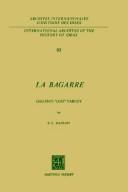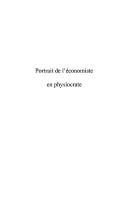| Listing 1 - 10 of 22 | << page >> |
Sort by
|
Book
ISBN: 1136509186 1315016532 0415313325 0415488842 9781136509186 1136509259 9781315016535 9781136509254 9781136509322 9780415313322 9780415488846 Year: 2003 Publisher: London : Routledge,
Abstract | Keywords | Export | Availability | Bookmark
 Loading...
Loading...Choose an application
- Reference Manager
- EndNote
- RefWorks (Direct export to RefWorks)
The volume includes translations of Physiocratic writings, also specialized essays, dealing with certain aspects of Physiocratic doctrine, its history and its influence
Physiocrats. --- Bodenreform --- Economists --- Physiocrats --- E-books
Book
ISBN: 9781783088560 1783088567 9781783088577 1783088575 1783088559 9781783088553 Year: 2019 Publisher: London : Anthem Press,
Abstract | Keywords | Export | Availability | Bookmark
 Loading...
Loading...Choose an application
- Reference Manager
- EndNote
- RefWorks (Direct export to RefWorks)
The mid-eighteenth century witnessed what might be dubbed an economic turn that resolutely changed the trajectory of world history. The discipline of economics itself emerged amidst this turn, and it is frequently traced back to the work of François Quesnay and his school of Physiocracy. Though lionized by the subsequent historiography of economics, the theoretical postulates and policy consequences of Physiocracy were disastrous at the time, resulting in a veritable subsistence trauma in France. This galvanized relentless and diverse critiques of the doctrine not only in France but also throughout the European world that have, hitherto, been largely neglected by scholars. Though Physiocracy was an integral part of the economic turn, it was rapidly overcome, both theoretically and practically, with durable and important consequences for the history of political economy. The Economic Turn brings together some of the leading historians of that moment to fundamentally recast our understanding of the origins and diverse natures of political economy in the Enlightenment.
Physiocrats. --- Economics --- Economic theory --- Political economy --- Social sciences --- Economic man --- Bodenreform --- Economists
Book
ISBN: 2130488706 9782130488705 Year: 1998 Volume: 96 Publisher: Paris : PUF - Presses Universitaires de France,
Abstract | Keywords | Export | Availability | Bookmark
 Loading...
Loading...Choose an application
- Reference Manager
- EndNote
- RefWorks (Direct export to RefWorks)
Comment l'économie politique en est-elle venue à faire figure de science générale de la société au milieu du XVIIIè siècle en France ? C'est le problème que soulève l'émergence de la " science nouvelle " de François Quesnay et de son oncle (la Physiocratie). Pour le comprendre, il faut explorer les différentes dimensions de la " science nouvelle " et partir des rapports qu'elle entretient avec la pensée économique de son époque, avec la philosophie et avec les nouvelles formes du politique. La " science nouvelle " puise dans le fonds des débats et des réflexions sur l'activité économique (l'économie et la théorie du commerce), mais s'en détache très nettement en prenant au sérieux les exigences de scientificité que la philosophie cartésienne et, surtout, sensualiste, font alors valoir.S'appuyant sur la théorie de la connaissance, la " science nouvelle " développe une réflexion sur le comportement intéressé des individus et l'associe au droit naturel pour concevoir un corps politique unifié autour du fonctionnement économique de différentes sortes de propriété. Finalement, elle porte la réflexion jusqu'au politique et préconise la formation d'un espace public bourgeois où, grâce à la diffusion du savoir qu'elle initie, le bien-être économique accompagne l'émergence d'un nouvel équilibre politique.
Economics --- Physiocrats --- Bodenreform --- Economists --- Economic theory --- Political economy --- Social sciences --- Economic man --- Physiocrats. --- Economie politique --- Physiocrates --- History. --- Histoire

ISBN: 9024721253 9400992998 9400992971 9789024721252 Year: 1979 Volume: 92 Publisher: The Hague Martinus Nijhoff
Abstract | Keywords | Export | Availability | Bookmark
 Loading...
Loading...Choose an application
- Reference Manager
- EndNote
- RefWorks (Direct export to RefWorks)
Economics --- Physiocrats --- Grain trade --- Economie politique --- Physiocrates --- Céréales --- Commerce --- Economic theory --- Political economy --- Social sciences --- Economic man --- Céréales --- Bodenreform --- Economists --- Produce trade
Book
ISBN: 3881290184 Year: 1976 Publisher: Frankfurt am Main Haag und Herchen
Abstract | Keywords | Export | Availability | Bookmark
 Loading...
Loading...Choose an application
- Reference Manager
- EndNote
- RefWorks (Direct export to RefWorks)
State, The --- Despotism --- Physiocrats --- Bodenreform --- Economists --- Absolutism --- Autocracy --- Tyranny --- Authoritarianism --- Dictatorship --- Totalitarianism --- Administration --- Commonwealth, The --- Sovereignty --- Political science --- Despotism. --- Physiocrats. --- State, The.

ISBN: 2262012822 Year: 1999 Publisher: [Paris] : Perrin,
Abstract | Keywords | Export | Availability | Bookmark
 Loading...
Loading...Choose an application
- Reference Manager
- EndNote
- RefWorks (Direct export to RefWorks)
"N'oubliez jamais, Sire, que c'est la faiblesse qui a mis la tête de Charles Ier sur le billot... Je souhaite que le temps ne me justifie pas". Quinze ans avant la chute de Louis XVI, Turgot est le premier - et longtemps le seul - à exposer par écrit au roi les abîmes où celui-ci court. Mais il en va souvent ainsi des Cassandre : Turgot est connu des livres d'histoire pour sa disgrâce expéditive en mai 1776 après deux ans d'un ministère tronqué : il reste comme le rare exemple d'un intellectuel libéral, ayant compris le principe des rendements décroissants en agriculture, partisan de la liberté totale du commerce et capable, avant Adam Smith, de formuler les rudiments de la théorie de l'équilibre économique. Toutes choses qui indiffèrent les Français de 1770 et expliquent la mauvaise réputation de ce précurseur misanthrope. Jean-Pierre Poirier a repris l'ensemble des archives disponibles pour brosser le portrait de ce visionnaire, ami des philosophes, coqueluche des salons de Paris, auteur d'un best-seller pourtant austère. "Réflexions sur la formation et la distribution des richesses". Il montre comment l'intendant de Limoges transforme sa région en laboratoire économique et social, traçant des routes, introduisant des espèces nouvelles, réorganisant la fiscalité et l'urbanisme, expérimentant avec rudesse et efficacité les remèdes qu'il proposera à Louis XVI pour sauver le pays de la banqueroute. Mais Versailles est un nid de vipères et Turgot comme le libéralisme sont vite taxés de révolutionnaires. C'est l'histoire de cette occasion manquée que Jean-Pierre Poirier raconte avec talent.
Bodenreform --- Fysiocraten --- Physiocrates --- Physiocrats --- Hommes d'État --- Libéralisme économique --- Finances publiques --- Turgot, Anne-Robert-Jacques --- France --- Politique et gouvernement --- Politique économique --- Economics --- History --- 18th century --- Physiocrates.

ISBN: 2738499961 9782738499967 Year: 2000 Publisher: Paris : Editions L'Harmattan,
Abstract | Keywords | Export | Availability | Bookmark
 Loading...
Loading...Choose an application
- Reference Manager
- EndNote
- RefWorks (Direct export to RefWorks)
Economics --- -Physiocrats --- Bodenreform --- Economists --- Economic theory --- Political economy --- Social sciences --- Economic man --- History --- -Physiocrats. --- Physiocrats. --- Physiocrats --- Economics - France - History - 18th century. --- PHYSIOCRATES --- ECONOMISTES --- FRANCE --- 18e SIECLE
Book
ISBN: 3770514793 9783770514793 Year: 1978 Volume: 48 Publisher: München Fink
Abstract | Keywords | Export | Availability | Bookmark
 Loading...
Loading...Choose an application
- Reference Manager
- EndNote
- RefWorks (Direct export to RefWorks)
Physiocrats --- Enlightenment --- Aufklärung --- Eighteenth century --- Philosophy, Modern --- Rationalism --- Bodenreform --- Economists --- Theses --- Economische geschiedenis. 18e eeuw. --- Europa (West). Economische geschiedenis. 18e eeuw. --- Verlichting (Filosofie) --- Physiocrates. --- Histoire économique. 18e s. --- Europe occidentale. Histoire économique. 18e s. --- Lumières (Philosophie) --- Fysiocraten.
Book
ISBN: 0678070075 0333111737 9780678070079 9780333111734 Year: 1972 Publisher: London : McMillan,
Abstract | Keywords | Export | Availability | Bookmark
 Loading...
Loading...Choose an application
- Reference Manager
- EndNote
- RefWorks (Direct export to RefWorks)
Economics --- Physiocrats --- 330.8 --- Economisch denken. Economische scholen. Economische theorieen --- Economics. --- Physiocrats. --- 330.8 Economisch denken. Economische scholen. Economische theorieen --- Bodenreform --- Economists --- Economic theory --- Political economy --- Social sciences --- Economic man
Multi
ISBN: 9781107681408 9781107021198 9781139108645 9781139377560 1139377566 1107021197 1139108646 9781139380423 1139380427 9786613633750 6613633755 9781139376136 9781280647703 1280647701 1139366408 1107231469 1139378996 1139376136 1139372149 1107681405 9781139366403 9781107231467 9781139378994 9781139372145 Year: 2012 Publisher: Cambridge : Cambridge University Press,
Abstract | Keywords | Export | Availability | Bookmark
 Loading...
Loading...Choose an application
- Reference Manager
- EndNote
- RefWorks (Direct export to RefWorks)
Physiocrats believed that wealth came exclusively from the land, that nature was fecund and man could harness its reproductive forces. Capital investments in agriculture and hard work would create profits that circulated to other sectors and supported all social institutions. Physiocracy, which originated in late eighteenth-century France, is therefore widely considered a forerunner of modern economic theory. This book places the Physiocrats in context by inscribing economic theory within broader Enlightenment culture. Liana Vardi discusses three theorists - Francois Quesnay; Victor Riquetti, marquis de Mirabeau; and Pierre Samuel Du Pont de Nemours - and shows how their understanding of mental processes, science, politics and the arts influenced their individual approach to economic writing. The difficulty in explaining the doctrine, combined with the expectation that the public would be persuaded by its arguments, mired physiocracy in endless contradictions. This work offers a framework for understanding physiocratic theory and its complicated relation to modern economics.
Physiocrats. --- HISTORY / Europe / General. --- Economic schools --- Economics --- Enlightenment --- Physiocrats --- Bodenreform --- Economists --- Aufklärung --- Eighteenth century --- Philosophy, Modern --- Rationalism --- Economic theory --- Political economy --- Social sciences --- Economic man --- Economics. --- Enlightenment. --- E-books --- Arts and Humanities --- History --- Mouvement des lumières --- Physiocrates
| Listing 1 - 10 of 22 | << page >> |
Sort by
|

 Search
Search Feedback
Feedback About
About Help
Help News
News